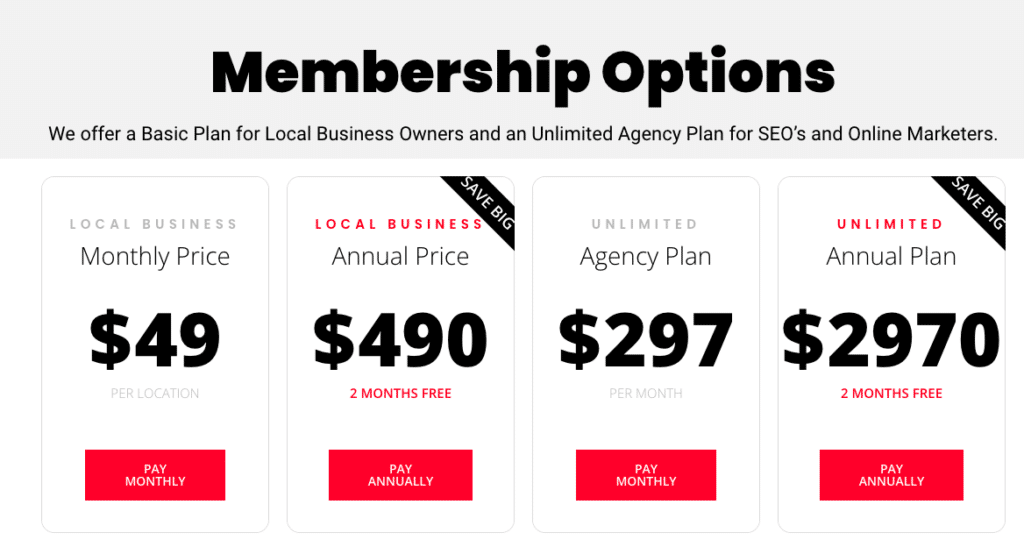Categories of Local Business Listings

Get a 14-DAY FREE TRIAL for 300 Local Citations you can edit on one simple dashboard.
Local business listings play a crucial role in the online visibility and success of businesses. They provide valuable information to potential customers, improve search engine rankings, and help businesses establish their presence in the local market. However, not all local business listings are created equal. There are different categories of local business listings that offer unique benefits and cater to specific business needs. In this article, we will explore these categories and discuss their importance in the digital marketing landscape.
1. General Directories
Get your FREE 14 DAY TRIAL for over 300 local citations. Click below!

General directories are the most common type of local business listings. These directories cover a wide range of industries and provide a platform for businesses to list their contact information, website, and other relevant details. Examples of general directories include Yelp, Yellow Pages, and Google My Business.
Get a 14-DAY FREE TRIAL for 300 Local Citations you can edit on one simple dashboard.
General directories are essential for businesses as they help improve their online visibility and increase their chances of being found by potential customers. These directories often have high domain authority and are trusted by search engines, which means that having a listing on these platforms can positively impact a business’s search engine rankings.
For example, let’s consider a local restaurant in New York City. By listing their business on Yelp, they can reach a wider audience and attract more customers. Additionally, when someone searches for “restaurants in New York City” on search engines like Google, Yelp listings often appear at the top of the search results, increasing the restaurant’s visibility.
Get a 14-DAY FREE TRIAL for 300 Local Citations you can edit on one simple dashboard.
2. Niche Directories
Niche directories are specialized directories that focus on specific industries or categories. These directories cater to businesses operating in niche markets and provide a more targeted platform for listing their services. Examples of niche directories include TripAdvisor for travel and hospitality businesses, Houzz for home improvement professionals, and Zocdoc for healthcare providers.
Niche directories are valuable for businesses as they allow them to connect with a highly relevant audience. By listing their business in a niche directory, businesses can reach potential customers who are specifically looking for the products or services they offer. This increases the chances of generating high-quality leads and conversions.
For instance, a boutique hotel in a popular tourist destination can benefit greatly from listing on TripAdvisor. Travelers often use TripAdvisor to find and book accommodations, and having a listing on this platform can significantly increase the hotel’s visibility and bookings.
Get a 14-DAY FREE TRIAL for 300 Local Citations you can edit on one simple dashboard.
3. Local Directories
Local directories are directories that focus on specific geographical areas. These directories are particularly useful for businesses that operate in a specific location or serve a local customer base. Examples of local directories include Citysearch, Local.com, and Chamber of Commerce directories.
Local directories are essential for businesses as they help them establish their presence in the local market. These directories often have a strong local user base and are trusted by local consumers. By listing their business on local directories, businesses can increase their visibility among local customers and improve their chances of attracting local foot traffic.
For example, a small bakery in a neighborhood can benefit from listing on a local directory like Citysearch. Local residents often use these directories to discover new businesses and find local services. By having a listing on Citysearch, the bakery can attract more customers from the surrounding area.
Get a 14-DAY FREE TRIAL for 300 Local Citations you can edit on one simple dashboard.
4. Industry-Specific Directories
Industry-specific directories are directories that focus on specific industries or professional services. These directories are particularly useful for businesses that operate in niche industries or offer specialized services. Examples of industry-specific directories include Avvo for legal professionals, Angie’s List for home services, and Healthgrades for healthcare providers.
Industry-specific directories are valuable for businesses as they allow them to target a highly relevant audience. These directories often have a strong user base of individuals actively seeking services in a specific industry. By listing their business on industry-specific directories, businesses can increase their visibility among potential customers who are specifically looking for the services they offer.
For instance, a personal injury lawyer can benefit from listing on Avvo. Avvo is a popular directory for legal professionals, and individuals seeking legal assistance often use this platform to find lawyers in their area. By having a listing on Avvo, the lawyer can increase their chances of being contacted by potential clients.
Get a 14-DAY FREE TRIAL for 300 Local Citations you can edit on one simple dashboard.
5. Social Media Platforms
Social media platforms are not traditional directories, but they play a significant role in local business listings. Platforms like Facebook, Instagram, and LinkedIn allow businesses to create profiles and provide information about their products or services. These profiles act as local business listings and can be optimized to improve online visibility.
Social media platforms are essential for businesses as they provide a platform for engaging with customers, sharing updates, and building brand awareness. By creating a profile on social media platforms, businesses can connect with their target audience, share valuable content, and attract potential customers.
Get a 14-DAY FREE TRIAL for 300 Local Citations you can edit on one simple dashboard.
For example, a local clothing boutique can create a Facebook page and share updates about new arrivals, promotions, and events. By engaging with their audience on Facebook, the boutique can build a loyal customer base and increase foot traffic to their physical store.
Get a 14-DAY FREE TRIAL for 300 Local Citations you can edit on one simple dashboard.
Local business listings are crucial for businesses looking to establish their online presence and attract customers. By understanding the different categories of local business listings, businesses can choose the platforms that best suit their needs and target audience.
General directories like Yelp and Yellow Pages provide a broad platform for businesses to list their contact information and improve their search engine rankings. Niche directories like TripAdvisor and Houzz cater to specific industries and allow businesses to connect with a highly relevant audience. Local directories like Citysearch and Chamber of Commerce directories help businesses establish their presence in the local market. Industry-specific directories like Avvo and Angie’s List target specific industries and help businesses reach potential customers actively seeking their services. Social media platforms like Facebook and Instagram provide a platform for engaging with customers and building brand awareness.
By utilizing a combination of these categories, businesses can maximize their online visibility, attract high-quality leads, and ultimately drive growth. Citation Vault is a local citation service that automates 300 local citations for any business, making it easier for businesses to manage their local business listings and improve their online presence.
Learn more about “The Benefits of Local Business Listings” here.
Frequently Asked Questions about The Categories of Local Business Listings

What are categories in local business listings, and why are they important?
Categories in local business listings refer to the specific sectors, industries, or niches that a business belongs to. For example, a business might be categorized as an “Italian Restaurant,” “Dental Clinic,” or “Boutique Clothing Store.” The importance of categories lies in their ability to:
Streamline Search: They help potential customers find your business when they’re looking for specific products or services.
Increase Relevance: Search engines use categories to display your business in relevant local searches, ensuring that the audience discovering your listing is more likely to convert.
Clarify Business Offerings: Categories help provide clarity about what your business offers, especially when the business name isn’t explicitly descriptive.
Can I select multiple categories for my local business listing, and are there any advantages to doing so?
Yes, most local listing platforms, like Google My Business, allow businesses to select a primary category and additional secondary categories. The advantages of selecting multiple relevant categories include:
Broader Visibility: Your business can appear in searches for various related services or products.
Better Targeting: It ensures that your business reaches different customer segments looking for the diverse services or products you offer.
Detailed Business Description: Multiple categories can provide a fuller picture of the scope of your business offerings.
However, it’s crucial to ensure that the categories selected genuinely represent your business. Misrepresenting can confuse customers and dilute your brand message.
How do I choose the most appropriate category for my local business listing?
Choosing the right category involves:
Research: Look at successful competitors or similar businesses and observe the categories they’ve selected.
Platform Suggestions: Some platforms might suggest categories based on your business description or name. Review these suggestions critically.
Customer Perspective: Think from a customer’s point of view. Which category would they likely search for to find your services or products?
Relevance: Always ensure the chosen category aligns with your core business offerings.
Do categories impact the performance of my local business listing in search results?
Absolutely! Categories play a pivotal role in local search algorithms. When a user conducts a local search, search engines aim to provide the most relevant results. By categorizing your business correctly:
Enhanced Visibility: Your business is more likely to appear in searches relevant to your category.
Higher Engagement: Since your listing appears in relevant searches, users interacting with it are more likely to be interested in your offerings.
Better Local Rankings: Consistently accurate and relevant category selection can positively impact your local search ranking over time.
Can I customize my own category if what I offer isn’t listed?
Most major platforms like Google My Business offer a set list of categories and don’t allow custom ones due to the risk of inconsistency and confusion. However, if you believe there’s a category missing:
Choose the Closest Match: Select the category that’s most closely aligned with your business.
Use Business Description: Compensate for the lack of a perfect category by providing a detailed business description.
Feedback: Some platforms might have a process for suggesting new categories or providing feedback. Make use of these channels to communicate any gaps you identify.
Selecting the right categories for your local business listing is an art that requires attention to detail and an understanding of your business and your customers. Correct categorization ensures you reach the right audience and gain the most out of your local online presence.






